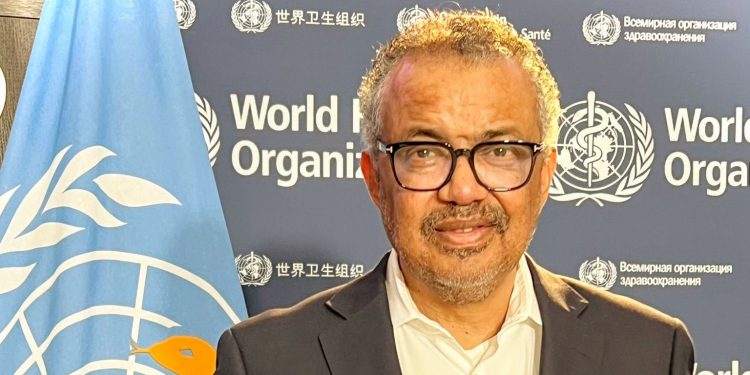World Health Organization (WHO) has revealed that so far this year, 2024, it has verified 1370 attacks on health care in 14 countries and territories, which also resulted to 805 deaths and 1545 injuries to health workers and patients.
WHO Director-General, Dr Tedro Ghebreyesus disclosed this at a Press Briefing on Tuesday in Geneva, said conflicts around the world have caused untold death, destruction and displacement, and often, health care has been in the crosshairs.
According to him, “The conflict in Gaza has led to the reemergence of polio, although the vaccination campaign that WHO and our partners conducted appears to have been successful in preventing any further cases”. Ghebreyesus spoke on the situation in Syria, saying since the appointment in the last few hours of a transitional govt in the Syrian Arab Republic which is bringing new hope to a country that has suffered so much.
Ghebreyesus spoke on the situation in Syria, saying since the appointment in the last few hours of a transitional govt in the Syrian Arab Republic which is bringing new hope to a country that has suffered so much.
“Since the military offensive began two weeks ago, hundreds of people have been severely injured, and an estimated 1 million people have been displaced, adding to the 7 million who were already displaced internally, and the 5 million who had left the country.
He added, “Health facilities in Aleppo and Idlib have been overwhelmed, some partners have suspended services, and 19 incidents of attacks on health care have been reported”. The DG lamented that meeting the health needs of displaced populations, and those who may now return to Syria, will put more strain on a health system that has already been weakened by more than 14 years of war.
The DG lamented that meeting the health needs of displaced populations, and those who may now return to Syria, will put more strain on a health system that has already been weakened by more than 14 years of war.
He recalled his visit to Aleppo, Idlib and Damascus last year where he saw just how fragile the health system was. “Even before the recent offensive began, less than two- thirds of hospitals and primary care facilities were functional;
“And almost 15 million people were already in need of urgent access to trauma, surgical care, treatment for noncommunicable diseases, maternal and child care, mental health support and more.
“In the past two weeks, WHO has sent 11 trucks of trauma and surgical supplies through cross-border operations to the Aleppo and Idlib regions and we’re scaling up efforts to distribute more essential medicines and supplies wherever needed. “Yesterday we also delivered trauma and surgical supplies to Al Mousat Hospital in Damascus, and we’re working to support additional hospitals in the coming days.
“Yesterday we also delivered trauma and surgical supplies to Al Mousat Hospital in Damascus, and we’re working to support additional hospitals in the coming days.
“Our teams are on the ground to assess the full scope of health needs, and to strengthen disease surveillance systems, as the risk of outbreaks, including of cholera, continues to grow.
“Our focus remains on addressing urgent health needs, restoring essential health services, and working closely with partners to strengthen Syria’s health system”, the DG explained.
He called for all parties to facilitate safe and unimpeded humanitarian operations to reach people in need wherever they are. In country that has suffered so much, we hope that this new dawn for Syria will lead to sustained peace”, Ghebreyesus added. The DG pressed further on threat of disease outbreaks, epidemics and pandemics which he said persist, while he recalled in August declaring a public health emergency of international concern over the outbreaks of mpox in Africa.
The DG pressed further on threat of disease outbreaks, epidemics and pandemics which he said persist, while he recalled in August declaring a public health emergency of international concern over the outbreaks of mpox in Africa.
According to him, “In September, Rwanda reported an outbreak of Marburg virus disease, which thankfully is under control now; We’ve seen the concerning spread of H5N1 avian influenza to hundreds of dairy herds in the United States, with 58 human cases;
“And while we are seeing progress against some diseases, we are losing ground against others. New data from WHO and partners published this year showed a 71% increase in deaths from cholera in 2023.
“And a 20% increase in measles cases, while the number of adults living with diabetes has quadrupled since 1990, and has now passed 800 million”. He added, “Less than two weeks ago, WHO was informed of an undiagnosed disease in the Democratic Republic of the Congo that has now caused 416 reported cases and 31 deaths.
He added, “Less than two weeks ago, WHO was informed of an undiagnosed disease in the Democratic Republic of the Congo that has now caused 416 reported cases and 31 deaths.
“Most of the cases and deaths are in children under 14 years of age, in the district of Panzi, in the western Kwango province of DRC. A provincial rapid response team was deployed on the 30th of November, which is now being supported by a national team of experts which arrived earlier today.
“The affected area is remote, telecommunications are severely limited and access has been made harder by the rainy season. It has taken the national response team several days to reach Panzi.
“The area also suffers from high levels of malnutrition and low vaccination coverage, leaving children vulnerable to a range of diseases including malaria, pneumonia, measles and others”.
The DG also revealed that of the 12 initial samples collected, 10 tested positive for malaria, “although it’s possible that more than one disease is involved. Further samples will be collected and tested to determine the exact cause or causes”, he said.
805 deaths from 1,370 verified heathcare attacks in 2024 – WHO
Please login to join discussion










